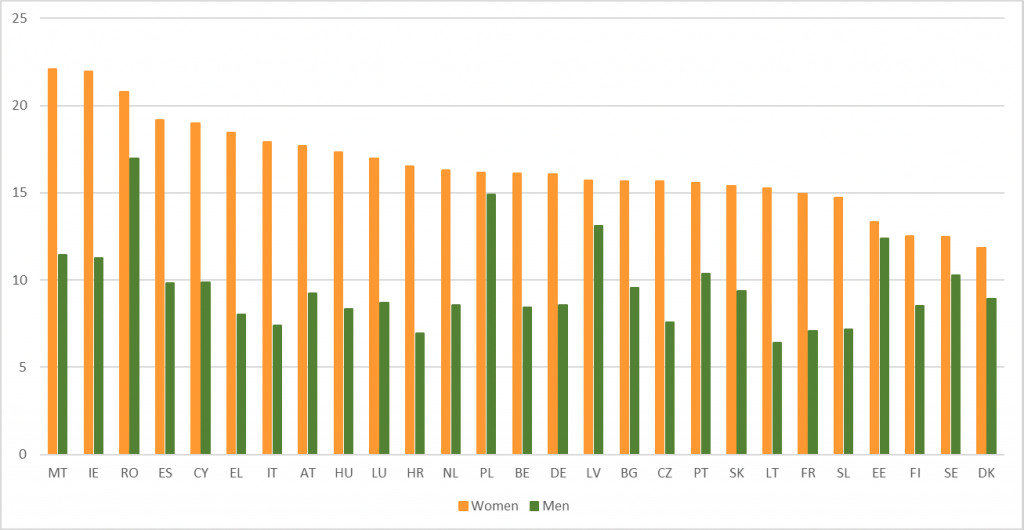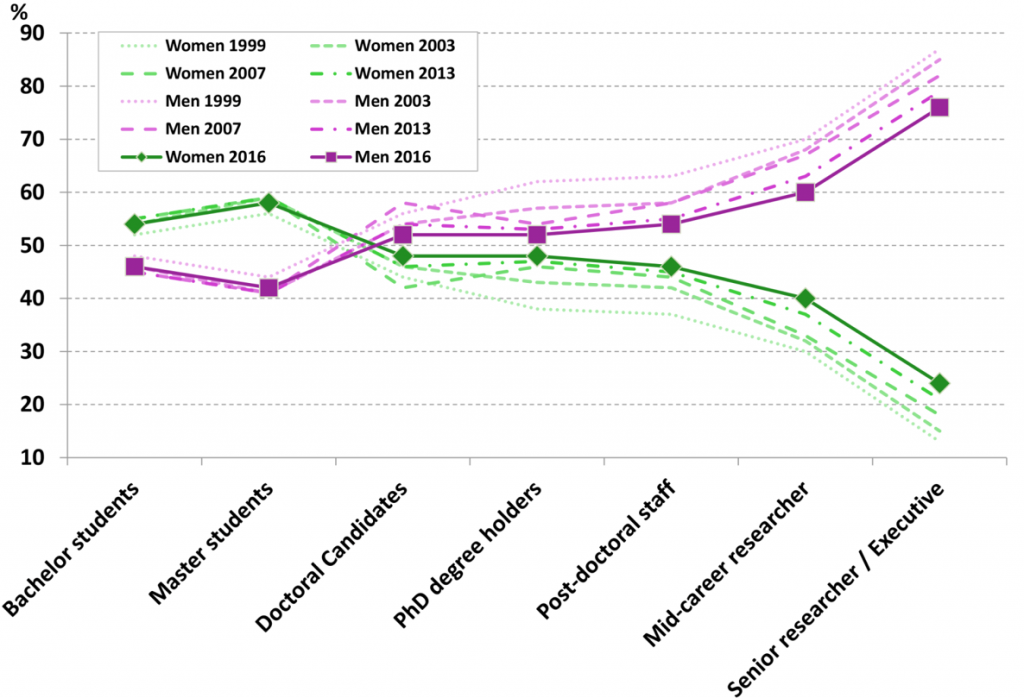The current COVID-19 pandemic is highlighting the critical role of scientific research in understanding and managing the global challenges that we are all exposed to. In 2020, we are confronted with a world-wide and major health crisis, unprecedented in contemporary history; but tomorrow it could be global warming, or primary resources scarcity, or energy crisis. Science, technology and innovation (STI) are crucial in solving the problems of today and tomorrow. However, the Coronavirus emergency is also bringing to light the pre-existing inequality that is present in the science, technology, engineering and mathematics (STEM) field.
Based on the reaction of institutions like the European Union and United Nations to the pandemic, including what has been published and organized in the past months, I would like to explore some of the possible consequences on the current disadvantages of marginalized groups as well as the outstanding initiatives that have been taken to counterattack this crisis and the broadening inequalities.

From a general point of view, one of the categories that are particularly vulnerable in the current situation are women. Despite the big steps towards equality that have been taken in the EU Member states, women still take most of the burden of the unpaid domestic workload and tending children and elderly, which is only intensified due to the lockdown and schools closing [1]. The 2016 European Quality of Life survey depicts this reality: in the majority of the Member states women still disproportionately take care of the household and of their children. Figure 1 shows the average number of hours women (orange) and men (green) declare to spend cooking and doing house chores in a week: the first is twice the latter in most countries. The trend is similar when the survey question regards the taking care and educating children [1]. Furthermore, the 2017 Eurobarometer data revealed that the common opinion regarding gender roles in most of the Eastern and Southern European Member states has not changed. A high portion of the people that participated in the survey agreed with the conservative and patriarchal gender norms of men as bread winners and of women having the role “to take care of her home and family” [1].
The 2020 JRC Science for Policy Report “How will the COVID-19 crisis affect existing gender divides in Europe?” claims that the increased in-house responsibilities as effect of lockdown could have long-term negative results on women’s labor market, as they are forced to reduce or give up the time dedicated to work, even in teleworking, to take care of domestic tasks. The JRC Report also mentions some promising tendencies, as the reversing of traditional roles due to the involvement of both partners in the household, and the social recognition of female workers in Education, Health and Social field in the front lines of the outbreak [1].
This disparity within society is reflected in the STEM field. As the situation demonstrates, it is very relevant to analyze the situation of the gender gap in research and academia in EU and explore the possible consequences of the pandemic and lockdown on women in the workforce. Figure 2 is the perfect representation of the “leaky pipeline” that has been used to describe the gender gap in STEM careers [2]. In the EU-28 states in 2016, while more than half of the students entering university are female, the vast majority of the senior positions in academia are covered by male researchers. The situation has indeed improved since 1999, but a lot has to be done to narrow the gender gap.

Figure 2: Proportion (%) of men and women in a typical academic career in EU-28, 1999-2016. Source: She Figures 2018 and 2015
As Figure 2 shows, women are poorly represented in high level positions, of course this is not just a problem of academia and STEM, but it touches every career path. The scarce representation of women has been also revealed during the COVID-19 crisis. Few female figures were involved in the decision-making and managing of the emergency, nor they were in charge, as experts and scientists, of spreading reliable information on the virus and prevention [1].
When women and minorities are represented in the decision-making, inequality issues are integrated into emergency responses for more effective, inclusive and fair policies. This has been proved by the performance of the women leaders of New Zealand, Finland, Iceland, Taiwan, Germany, Denmark and Norway [3]. These Prime Ministers have stepped up promptly and contrasted the Coronavirus spreading with efficient and unconventional methods.
The situation of the health crisis is still very difficult at the moment, but there are some positive initiatives to take into account regarding STI policies and women representation.
First of all, the Coronavirus Global Response, launched by President of the European Commission Ursula von der Leyen, has pledged €15.9 billions for universal vaccination, treatment and testing [4].
UN and UNESCO have also responded actively to the crisis by organizing policy roadmaps, tools and webinars in order to keep the community and the leaders informed [4].
An example is the UNESCO’s Organization for Women Scientists for the Developing World, that has published the survey “Responding to COVID-19” to tell the experience of the researchers and professionals of their network. The inspiring stories tell how different communities have reacted to the pandemic and the impact on women throughout the world. The survey helps to highlight the impact of pandemic on universities and research facilities, particularly and unequally felt in developing countries with fewer resources for remote learning and working, and even more by women having increased responsibilities [6].
The webinar “Sharing Knowledge and Actions on COVID-19” was organized in June 2020 by the L’Oréal-UNESCO For Women in Science Alumnae Network for leading women experts in virology, epidemiology, and related fields to share knowledge and explore potential collaboration. It was an opportunity to renew the support for women’s participation in science and to share experiences in order to better understand the key role played by scientists at international, national, and regional level. One point that was raised is the need to provide a platform for experts to exchange information, resources and knowledge, particularly when it comes to global emergencies [7].
In agreement to this discussion, Open Science and cooperation are the two pillars suggested by Intergovernmental Mobilization of Ministers of Science to counter COVID-19 [5]. Reliable scientific evidence is crucial for policy makers to make informed and inclusive decisions to counter and prevent such crisis. In addition, citizens are more prone to behave responsibly and demystify false information when they are informed with scientific facts by trustworthy experts. Therefore, robust STI systems and funding are found to be very important in times of emergency.
Furthermore, UNESCO advocates for Open Science, international scientific collaborations, sustainable investments in STI, and policy support to STI [5]. The agency declares that Open Science consists of a game-changer to reach the goal of equal access to STI as the human right to science. Open Science would help to increase the participation of women, minorities, and developing communities in STEM research.
Inclusivity in STI research and in policy making is the key for a more responsible and well-informed management of the challenges to be faced at national and international level. Cooperation and sharing of knowledge should be encouraged, not only for transparency and development of the scientific community, but also for the integration of whole society. In conclusion, the COVID-19 crisis should be seen as an opportunity to challenge the social dynamics in order to bridge the gender gap.
This text was written by Beatrice Musig
Sources:
[1] Blaskó, Z., Papadimitriou, E., Manca, A.R., How will the COVID-19 crisis affect existing gender divides in Europe?, EUR 30181 EN, Publications Office of the European Union, Luxembourg, 2020, ISBN 978-92-76-18170-5, doi:10.2760/37511, JRC120525.
[2] https://euraxess.ec.europa.eu/worldwide/japan/gender-equality-human-resources-research-and-marie-sklodowska-curie-actions
[3] Avivah Wittemberg-Cox, What do countries with the best coronavirus reponses have in common? Women leaders, Forbes, 2020 https://www.forbes.com/sites/avivahwittenbergcox/2020/04/13/what-do-countries-with-the-best-coronavirus-reponses-have-in-common-women-leaders/#12855ee03dec
[4] https://global-response.europa.eu/index_it
[5] https://en.unesco.org/covid19/sciencesresponse/international-scientific-cooperation
[6] https://www.owsd.net/resources/owsd-and-covid-19 [7] https://en.unesco.org/news/women-scientists-share-knowledge-and-initiatives-address-covid-19

